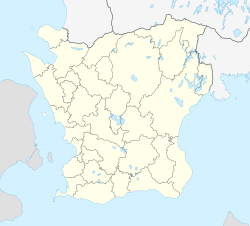| Ovesholm Castle | |
|---|---|
Ovesholms slott | |
| Kristianstad Municipality | |
 Ovesholm Castle | |
| Site information | |
| Open to the public | No |
| Location | |
Scania, Sweden | |
| Coordinates | 56°00′02″N14°00′06″E / 56.000485°N 14.001742°E |
| Site history | |
| Built | 17th century |
Ovesholm Castle (Swedish : Ovesholm slott) is a manor house at Kristianstad Municipality in Scania, Sweden. [1]
Contents
Carl Adam Wrangel (1748-1829), governor of Kristianstad, had the manor house built in 1792–1804. Count Axel Raoul Hamilton (1787-1875) had an extension built in 1857. [2] [3]

